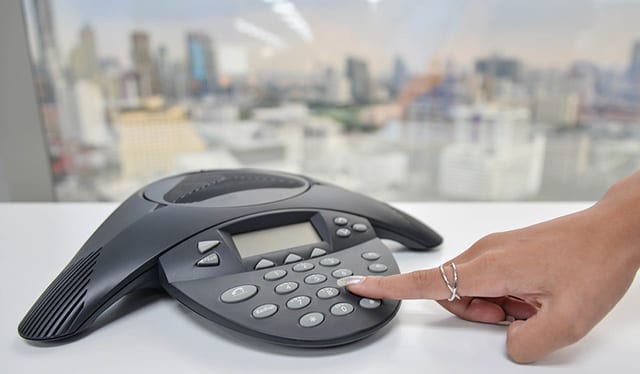
Let’s find what you’re looking for. Search our resources, blog, pages, and any other content on our website.
Business phone systems have come a long way over the years. Rather than using traditional landlines, the vast majority of business phone systems now run on Voiceover Internet Protocol (VoIP) networks. Since there are different types of VoIP systems, it can be difficult to decide which, if any, is right for your business. Here’s a review of the most popular options, as well as some feedback about which ones we consider to be the best phone solutions for small businesses.
Business VoIP phone systems use the same Internet connection as a business’s existing network infrastructure. VoIP calls are made through a VoIP handset, a computer or apps on a mobile device. VoIP handsets look just like traditional landline phones, with Ethernet cords that connect to the Internet instead of phone jacks. Today, more than 80 percent of businesses use VoIP phone systems. Affordability is one of the biggest advantages of business VoIP. Companies that use VoIP services don’t have a closet or room full of wiring or equipment to maintain. Upfront costs are minimal and typically limited to routers, Ethernet cables and handsets.
Before VoIP, most companies used PBX (Private Branch Exchange) phone systems. A PBX is a telephone network used within a company. The original PBXs date back decades ago to the switchboards of the 1950s. They evolved into the landline systems companies used before VoIP (and the Internet) became commonplace. Originally, the biggest benefit of a PBX system was that it allowed companies to have one main number, with separate extensions for each employee. While this is a given now, prior to PBX systems, companies had to pay for separate phone lines for each employee. During its heyday, the PBX system saved businesses considerable amounts of money.
Today, the on-premise PBX is considered dated technology. The system necessitates specific hardware and wiring, all of which is housed on-premise in a closet or room on-site and requires regular maintenance from IT or a certified technician. This makes it a more cost-prohibitive option for businesses. At the same time, some companies find that on-premise PBX phone systems are their best option. This is particularly true if the company is located in an area that does not have a reliable Internet connection or the bandwidth needed to support VoIP calling in addition to its network traffic.
Hosted PBX is an off-site or cloud-based VoIP system that combines the benefits of an on-premise PBX with the technology of Internet calling. Companies that use hosted PBX services don’t have to purchase or upgrade hardware, allowing them to take advantage of lower prices. Hosted PBX systems typically provide more features than what you’d get from a traditional phone company or an on-premise PBX system, including dial-by-extension directories, voicemail and email capabilities, call recording and call logs, music on hold and more.
Virtual PBX is similar in function to hosted PBX, but with fewer features. This economical phone system is a business VoIP PBX system designed for very small companies, home offices or freelancers who need a budget phone system that is limited to inbound calls. A standard virtual PBX uses an auto-attendant that reroutes incoming calls to cell phones, landlines or VoIP locations. Companies that opt for virtual PBX will still need a system that allows them to make outbound calls or calls within the company.
For most small businesses, hosted PBX phone systems provide the most well-rounded option. The low cost, numerous features and updated technology make them ideal for staying connected with customers and other employees.